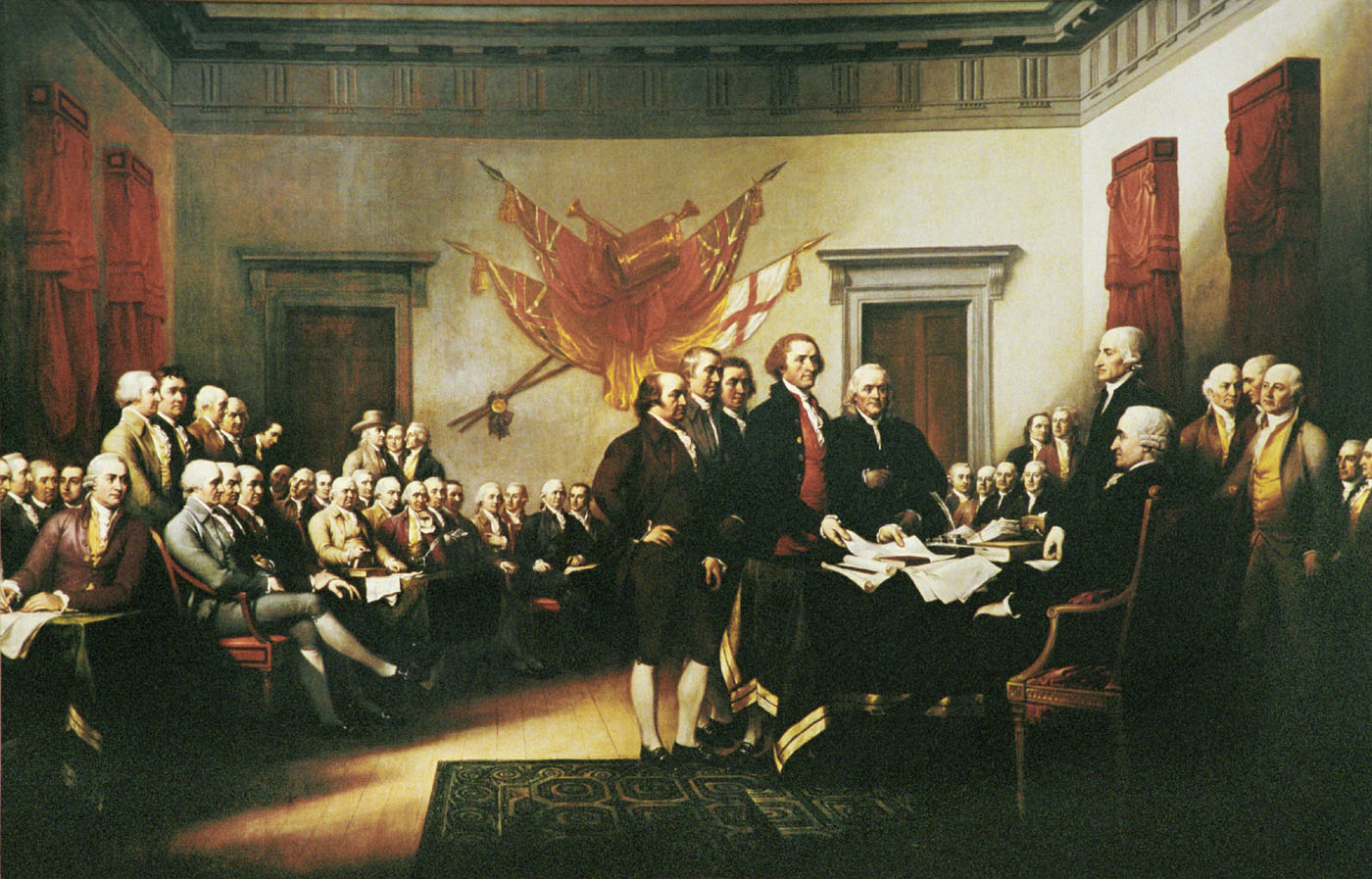Displaying items by tag: rights
Evidently, Not so Self-Evident
Related: Saving Lives Now with a Winning Strategy, by Jeanneane Maxon
Related: Fight to Win: An Argument for a State Human Life Amendment
 |
We hold these truths to be self-evident, that all men are created equal,
that they are endowed by their Creator with certain unalienable Rights,
that among these are Life, Liberty and the pursuit of Happiness.
There are perhaps, no better known or rehearsed words in American history than these, which are embedded in the foundational document of the United States.
In the Declaration of Independence, the framers articulated two self-evident truths:
- All men are created equal, and
- Those men are endowed by their Creator with certain unalienable rights, starting with life, liberty and the pursuit of happiness.
Those are possibly some of the most profound and meaningful words ever penned.
However, we also know that on the face of this profound and meaningful document itself, the words, and presumably the inalienable rights, applied only to certain men. One of those inalienable rights—the right to vote, to sway the system of government—belonged only to men.
Gender inequality: All men are created equal…
If owning property or just about anything else is an inalienable right, then women were denied that right as well.
In a letter to her husband, John Adams, in 1776, Abigail Adams wrote, "in the new Code of Laws which I suppose it will be necessary for you to make I desire you would Remember the Ladies." His answer: "As to your extraordinary Code of Laws, I cannot but laugh… We know better than to repeal our masculine systems."
Appealing to her husband’s sense of fairness and desire for liberty for all, Abigail Adams wrote again, “I can not say that I think you very generous to the Ladies, for whilst you are proclaiming peace and good will to Men, Emancipating all Nations, you insist upon retaining an absolute power over Wives."
This appeal fell on apparently deaf ears.
And so it was that women could not vote or be elected as presidents, senators, or anything else until 1920 by virtue of the 19th Amendment. From 1776 to 1920, it was clearly not self-evident that women had inalienable rights.
[Related: Saving Lives Now with a Winning Strategy, by Jeanneane Maxon]
Racial inequality: All men are created equal…
We further know that at the time those words were penned, non-landowners, African Americans, and those deemed too young (under 18) were specifically excluded not only from voting, but from other inalienable rights as well. In fact, some colonies, in 1776, prohibited any of these classes of people not only from owning land, but in some cases, from owning a gun, joining the militia, or owning real property.
Evidently, when the framers wrote that it was a self-evident truth that all men are created equal, they were really referring only to white, land-holding men. It was evidently not so self-evident that God created all people—men and women, black and white, slave and free, rich and poor—with unalienable rights.
A battle from the beginning
Black people, both slaves and free, also tried to get equal rights under the new Constitution. In 1777, Prince Hall and eight other black men wrote a petition to the courts of Massachusetts arguing the following:
[Y]our Petitioners apprehend that they have in Common with all other men a Natural and Unalienable Right to that freedom which the Grat Parent of the Universe that Bestowed equally on all menkind and which they have Never forfeited by any Compact or agreement whatever.
In his first draft of the Declaration of Independence, Thomas Jefferson named the following among the list of offenses committed by the British crown:
[He] has waged cruel war against human nature itself, violating its most sacred rights of life and liberty in the persons of a distant people [the Africans] who never offended him, captivating and carrying them into slavery in another hemisphere, or to incur miserable death in their transportation thither.
But Jefferson’s above defense did not gain traction with the rest of the framers. Instead, when writing the Constitution, the Founding Fathers eventually agreed to the Three-Fifths Compromise, which counted each black man as three-fifths of a white man in censuses, yet did nothing to give freedom or rights to black individuals.
In fact, the truth that African Americans had unalienable rights took another 180 years, at least two Supreme Court decisions, marches, protests, arrests, and spilled blood before the government truly acknowledged that African Americans were endowed with unalienable rights, including the right to freely vote.
[Related: Fight to Win: An Argument for a State Human Life Amendment]
The struggle for suffrage
But the issue was not just that blacks did not have the right to vote, which would be wrong in and of itself. It was the logical underpinnings of that denial of suffrage that were truly objectionable. The right to vote does not exist in a vacuum. It is given to those society values and accepts within the ranks as having equal footing with all, worthy of the protection afforded to all.
For 180 years following the Revolutionary War, blacks were not treated as those to whom God had endowed with unalienable rights.
Likewise, Native Americans were not allowed to vote in the first 100-plus years of American life. The Constitution (Article I, section 2) states that "Indians not taxed" should not even be counted in the census at all. The men who wrote the Constitution held that Native Americans belonged to their own group, and were not part of the United States at all.
Native American men did not get the right to vote until 1889, and then only if they left their tribes and lived like white men. It wasn’t until 1924 that tribal Indians could vote. And before 1924, it is doubtless a scar upon America’s history that Native Americans were forcibly removed from their ancestral land.
A final inconsistency in voting rights was corrected in 1971 by the 26th Amendment, which granted 18-year-olds the right to vote. This amendment was passed in response to Vietnam War-era protests that the same young men who were drafted into war did not themselves possess a right to vote.
Taking all these classes of people together, only about a quarter of the adults in the United States could vote immediately following the Revolutionary War. All men created equal, endowed by their Creator with certain unalienable rights? Self-evident Not really.
These truths did not become self-evident for many classes of people until much later, and only then after several hard-fought battles.
The truth is that what was said to be self-evident in 1776 only became truly evident over time, as a result of sustained effort by the people. No one would argue today that blacks, women, those who do not own property, 18-year–olds, or Native Americans should be denied equal status as humans with inalienable rights.
But in 1776, that was evidently not self-evident.
The new unprotected group
Personhood Amendments seek to make it self-evident that life begins at fertilization—the embryo is a human being. And while embryos are not given the right to vote, or own property, he or she certainly has the inalienable right of protection.
There are currently several states in which personhood amendments are either pending or proposed. A Personhood Amendment seeks to define personhood in a state Constitution. In short, Personhood Amendments seek to define life as starting at fertilization and thereby worthy of legal protection.
In Georgia, a Personhood Amendment passed by a super majority in July, 2012. In North Dakota, the Personhood Amendment states in part, “the inalienable right to life of every human being at any stage of development must be recognized and defended.”
In Mississippi, the failed Personhood Amendment (2011) stated the following:
As used in this Article III of the state constitution, the term ‘person’ or ‘persons’ shall include every human being from the moment of fertilization, cloning or the functional equivalent thereof.
These amendments are controversial, both among Christians and non-Christians, as well as pro-life and pro-abortion camps. Is such an amendment necessary? Is such an amendment wise? Is pursuing such an amendment helpful or harmful to the pro life movement?
In this issue of Capitol Matters, Heartbeat presents two strongly pro-life attorneys—Rob Muise, American Freedom Law Center and Jeanneane Maxon, Americans United for Life—who debate the two sides of the issue.
We present them primarily to demonstrate two differing opinions within the pro-life movement. We also present their arguments to provoke thinking and discussion, and hopefully, as Hebrews 10:24 instructs us, to love and good works.
Related: Saving Lives Now with a Winning Strategy, by Jeanneane Maxon
Related: Fight to Win: An Argument for a State Human Life Amendment
by Ellen Foell, Esq., Heartbeat International Legal Counsel

